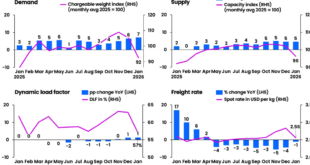The Home Office is taking weeks to inform Ukrainian refugees they have been granted a UK visa due to a breakdown in communications within the department, a senior official has told i.
The Home Office source said thousands of refugees from the war-torn country seeking shelter in the UK are often waiting weeks to find out they have a visa even after it has been approved by the UK Visa and Immigration (UKVI) agency.
The official said: “The delays in getting visas to Ukrainians can no longer be put down to them being new schemes. The Home Office has had time to sort this out.
“What is for certain is the left hand doesn’t know what the right hand is doing.”
Another Home Office official, who also confirmed the delay in telling Ukrainian applicants their visa had been granted, said: “The problem with the Ukrainian visas isn’t the ambition, which is to allow them to come, but that the systems do not work. In essence the political decision to make sure security checks are done means that the checks take time.
“Therefore, despite more people being put into the team they can’t make the checks any quicker and this leads to the delays.”
It is understood the Home Office is aware of the issue and is advising Ukrainian applicants who believe they should have received a Permission to Travel letter following the granting of a visa to contact the Government’s Ukraine helpline where agents can escalate their case to a dedicated team.
The latest official figures show UK Visas and Immigration (UKVI) has approved 71,800 visas under the Homes for Ukraine scheme and the Ukraine Family Scheme. Of those, only 21,600 have arrived in the UK. The Home Office did not comment on how many Ukrainians were yet to be informed that their visas had been approved.
The United Nations projects 8.3 million people will flee Ukraine, with five million having already left as Russia intensifies its attacks in the east and south of the country.
The vast majority of those escaping Ukraine have sought shelter from the war in nations across the border. Poland has offered refuge to almost three million Ukrainians, Romania 770,000, Hungary 480,000, Moldova 430,000 and Slovakia has taken in 350,000 of those displaced by the conflict.
However, non-border nations such as the Czech Republic and Germany have also taken in tens of thousands more Ukrainians than the UK.
Stuart Small, who has just welcomed best friends Viktoriia and Iryna and their young children into his home in Diss in Norfolk, is one host who has first-hand experience of the delay in a visa being granted and the refugees being informed they are free to travel to the UK.
He said Viktoriia and Iryna only made it into the UK after arriving at a ferry terminal in Calais last Friday and asking border officials to check if their visas had been approved.
“They just showed up in Calais on Friday [22 April] and asked the officials to check if their visas had been granted,” said Mr Small. “A quick check showed that they had been approved on 11 April, but that no one from the Home Office had contacted them to tell them they could travel to the UK.
“Then they were sent all the emails they should have been sent to prove they had got their visas. Then they sailed over to Dover on Saturday, and I drove them home to Diss.”
Mr Small added that he believed the delays in the visa process “had to be deliberate”.
“I think they’re deliberately not sending the emails because it’s a financial burden taking on people from any other country,” he said. “We’re talking about women and children who have been really traumatised by the war. The cost of dealing with that is something the Government does not want to bear.”
While the Home Office did not deny there are delays in informing Ukrainian refugees they had been approved for a visa to the UK, it rejected the delays were a deliberate strategy.
A spokesman for the Home Office said: “We reject this claim entirely, in less than six weeks more than 71,800 visas have been granted and 21,600 Ukrainians have arrived safely in the UK.
“The Home Office are now granting thousands of visas a day – this shows the changes made to streamline the service are working and we’ll continue to build on this success so we can speed up the process even further.”
The Home Office believes the delays in informing refugees they were able to travel to the UK are down to issues such as confirmation emails going into spam or junk filters, or that the Ukrainian applicant had provided the incorrect email details.
However, Mr Small added Viktoriia and Iryna had provided their correct emails addresses and that, when the emails from the Home Office were sent, they arrived in their main inbox and not in spam or junk folders.
It has also emerged Ukrainians are being delayed from seeking shelter from the war in the UK due to failure to grant visas to everyone in a family hoping to travel at the same time.
More on Home Office
Kate Clarkson, a Manchester-based nurse, helped a mother and daughter in Poland apply for visas more than a month ago. She explained that the mother she is sponsoring has received her visa, but her 21-month-old daughter is still waiting.
While in a refugee camp in Warsaw the pair caught rotavirus, and the toddler became unwell and had to go to hospital. Calling the process “an absolute nightmare”, Ms Clarkson said she is “ashamed to be British because of the way we are treating people”.
Home Secretary Priti Patel said another reason “low” numbers of people fleeing the war in Ukraine were arriving in the UK is that applicants choose to stay closer to home in border countries despite applying for a UK visa.
Ms Patel told MPs: “First and foremost, as we’ve heard repeatedly from the Ukrainian government . . . those families want to stay in the region.”
Addressing the point on younger children not receiving their visa along with a parent, the Home Secretary added: “Much of that is down to the checks because they’re not always travelling with parents and safeguarding checks are being undertaken to ensure that they are all linked members of families.”
Source link


